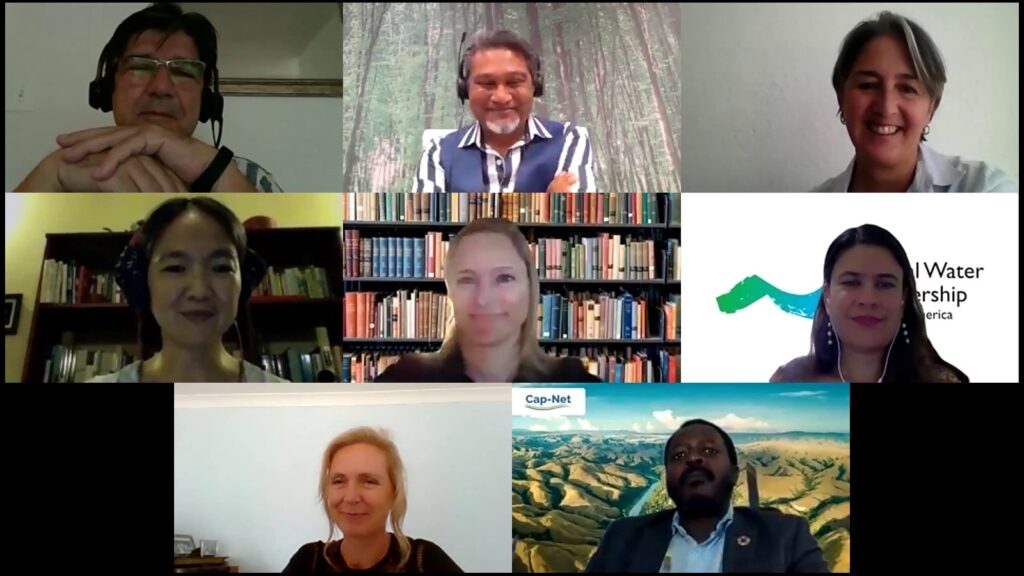Find panellists’ slide presentations here: Jenny Grönwall, Dhesigen Naidoo, Diana Suhardiman, Themba Gumbo, Fabiola Tábora, Géraldine Gené

Click here to read more about the Panellists
Integrated Water Resources Management (IWRM) is a process which promotes the coordinated development and management of water, land and related resources in order to maximise economic and social welfare in an equitable manner without compromising the sustainability of vital ecosystems and the environment. The Human Rights Based Approach (HRBA) provides a process and a legal methodology for inclusion of all people, for non-discrimination, participation, sharing of data, and accountability. By taking into account the needs and rights of all vulnerable groups, and including them in the decision-making process, a sustainable solution is more likely to be supported.
With different perspectives from experts in human rights, water governance and IWRM, this webinar examined some of the tools and case studies behind this approach, with the hope of sharing some of the thinking behind the HRBA and encourage more inclusive management of water rights.
Human Right 2 Water’s Chief Executive Amanda Loeffen opened the webinar with an introduction of the panellists and the topic, making note of the relevant issue that “IWRM can overlook the need to fully consider all vulnerable groups, and the protection of the human rights to water.” This ongoing conflict emphasises the need for a human rights-based system to offer an entry point for such questions of justice.
The webinar was jointly hosted by an expert in this specific field, Senior Chief of IWRM at OAS, Max Campos who reinstated the fact that by “bringing a human right approach to IWRM, we are guaranteed that the most vulnerable are included.” Because access to safe drinking water and sanitation has been recognised as a human right, the human rights system offers opportunities to streamline water governance and to provide coherence both in the sphere of environmental sustainability and in terms of human development.
Human Right 2 Water was also pleased to welcome Jenny Grönwall, an advisor in water policy and rights with SIWI’s Water Governance Department, who set the scene by discussing the link between the IWRM process and a human rights-based approach. She noted that “from the IWRM perspective, the human rights framework offers an added value to the ‘3Es’ of sustainable development.” These being:
- Economic Efficiency in water use,
- Social Equity,
- Environmental and Ecological aspects
In other words, with decisions to allocate scarce water resources, they must first set aside water for personal and domestic use and by prioritising vulnerable groups.
Next to speak was the President of Human Right 2 Water and Chief Executive of the Water Research Commission in South Africa, Dhesigen Naidoo. He points out that “It is quite clear that there aren’t enough resources on the continent [Africa] in spite of our huge ingenuity,” before broadening the topic by introducing case studies in the African Regions where a human rights-based approach has supported more inclusive community outcomes for IWRM.
Moving to a perspective from Laos, Diana Suhardiman, Research Group Leader in governance and inclusion at IWMI, continued the webinar, as she presented a range of case studies from the Asian Region, focusing on the poorest and most marginalised groups. Summarising the key advantages in linking water governance research with human rights to water Diana stated that “It enables us to focus on participation, representation and accountability towards more equal and inclusive development.”
Speaking from Africa, CapNet’s Director Themba Gumbo examined some case studies in which a human rights-based approach has supported sustainable outcomes in river basin management. Talking about various ways in which CapNet has made a difference in the last five years Themba brought light to the “shared learning and joint planning for the design/revision of policies, plans and strategies towards a human rights based approach.”
Fabiola Tábora, Regional Coordinator at the Global Water Partnership in Honduras, brought her own perspective from the Latin American point of view, asking what has triggered the community-led water and sanitation management systems and what are its main successes? Fabiola gave an example of the Honduras in which “they consider that the water and sanitation law gives the responsibility of the provision of the water and sanitation services to municipalities.” Therefore, the municipalities can coordinate with community led organisations to ensure that they provide a good service to the population.
The webinar’s final speaker was Human Right 2 Water’s own legal director, Géraldine Gené, who described the process that Mexico has followed to introduce the human rights to water and sanitation into river basin management, and the need for indicators to track compliance. Whilst discussing the collaboration with the Mexican National Water Commission, CONAGUA, Géraldine stated that “It is through the process of monitoring human rights indicators, that each river basin authority will be able to track their own compliance with human rights for water and sanitation and hence realise progressive realisations to SDG6.”

Over a hundred attendees and two hundred registrants joined us from all over the globe, including Asia, Africa and the Americas.
For those of you who were unable to join, a recording of the webinar is available.
Next month’s webinar will focus on the importance of engaging young people in the dialogue on water and human rights. The event will be held on the 7th October with further details to be announced shortly.

